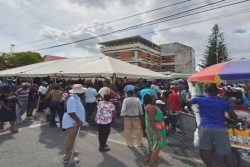HAVANA, (Reuters) – Cuba’s government said yesterday a spike in demand for fuel, caused in part by the failure of the country’s largest power plant last week, had led to fuel shortfalls at service stations nationwide, prompting hours-long queues for gasoline.
Lines of cars, buses, trucks and motorcycles as long as a kilometer formed at gas stations in Cuba’s capital this week, piling fresh frustration atop a biting economic crisis that has already left food and medicine in short supply across the island.
Ruling Communist Party newspaper Granma said Cupet, the national fuel distributor, had been forced to deliver more gas and diesel recently to service stations as well as the country’s backup system of smaller generation plants called into action after the Antonio Guiteras power plant broke down last week.
“The distribution of diesel and gasoline to service centers in the country has been affected in recent days due, among other causes, to an increase in demand,” reported Granma.
The Antonio Guiteras plant came back online Tuesday.
Cupet said it continues to make “enormous efforts to guarantee the usual supply (of fuel) to the economy and the population,” according to the Granma report.
On Wednesday in Havana, long lines at service stations once again formed early throughout the city. Tourists driving rental cars were given preferred access to two service stations in the capital, according to local media.
A Matanzas provincial official told a local state-owned newspaper late last week that rationing in that province, which began Sunday, would be temporary and was primarily due to distribution issues, not fuel shortages.
Cuba’s fuel supply has grown increasingly precarious in recent years, according to experts, as U.S. sanctions have complicated imports and both domestic production and refining have declined.
Russia’s invasion of Ukraine and related sanctions and boycotts have led to increased oil prices and concerns over supply globally, further complicating Cuba’s efforts.




